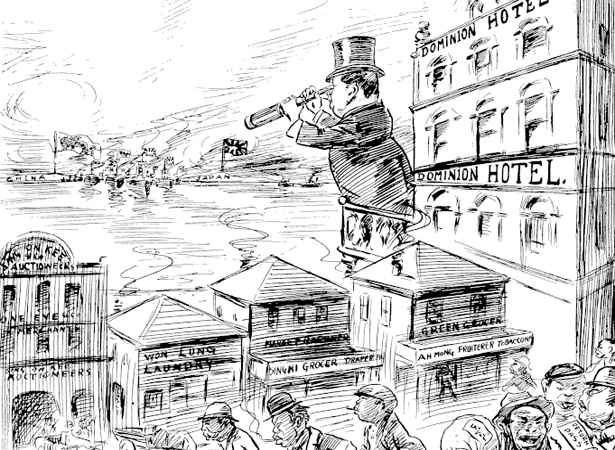
A meeting in Dunedin presided over by the mayor unanimously called for a ban on further Chinese immigrants.
New Zealand in the 19th century strived to be a ‘Britain of the South Seas’ and Pākehā saw non-white immigrants as undesirable. The discovery of gold in California, Canada, Australia and later New Zealand attracted many Chinese men wanting to make their fortunes before returning home.
In the 1860s the Dunedin Chamber of Commerce sought to replace European miners who had left Otago for the new West Coast fields. Chinese were seen as hard-working and law-abiding, and they were also willing to rework abandoned claims. The first 12 men arrived from Victoria in 1866; 2000 more had followed by late 1869. Chinese women seldom migrated to New Zealand. In 1881 there were only nine women to 4995 men, raising fears that white women were at risk from Chinese men.
As work on the goldfields became harder to find, anti-Chinese prejudice resurfaced. Some spoke of a conspiracy to overrun the colony with ‘Coolies’ who were ‘ignorant, slavish, and treacherous’. Canada and Australia had imposed entry taxes on Chinese immigrants and New Zealand followed suit via the Chinese Immigrants Act of 1881. A poll tax of £10 (equivalent to nearly $1800 today) was introduced, and ships arriving in New Zealand were restricted to one Chinese passenger per 10 tons of cargo. In 1896 this ratio was reduced to one passenger per 200 tons of cargo, and the poll tax was raised to £100 ($20,000). In the late 19th and early 20th centuries organisations such as the Anti-Chinese Association, the Anti-Chinese League, the Anti-Asiatic League and the White New Zealand League emerged to oppose Chinese immigration.
From 1907 all arriving Chinese were required to sit an English reading test, and from 1908 Chinese who wished to leave the country temporarily needed re-entry permits, which were thumb-printed. Permanent residency was denied from 1926 and Chinese did not become eligible for the old-age pension until 1936. Although other changes made the poll tax largely irrelevant from the 1920s, the legislation enabling it was not repealed until 1944. In 2002 the New Zealand government officially apologised to the Chinese community for the suffering caused by the poll tax.
How to cite this page
'Anti-Chinese hysteria in Dunedin', URL: https://nzhistory.govt.nz/anti-chinese-hysteria-dunedin, (Ministry for Culture and Heritage), updated 8-Oct-2021
